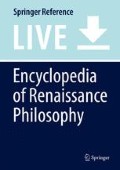Abstract
Jacopo Zabarella (1553–1589) is considered one of the most acute and brilliant logicians of all time. He made an important contribution to the interpretation of Aristotle and developed original ideas especially in the field of logic and epistemology, opening up the pathway of early modern science.
References
Berti, Enrico. 2009. Nuovi studi aristotelici. IV/1 – L’influenza di Aristotele. Antichità, Medioevo e Rinascimento. Brescia: Morcelliana.
Bouillon, Dominique. 2009. L’interprétation de Jacques Zabarella le philosophe. Paris: Garnier.
Dal Pra, Mario. 1966. Un “oratio” programmatica di G. Zabarella. Rivista Critica di Storia della Filosofia 21: 286–291.
Edwards, William F. 1960. The logic of Jacopo Zabarella (1533–1589). PhD dissertation, New York.
Mikkeli, Heikki. 1992. An Aristotelian response to renaissance humanism. Jacopo Zabarella on the nature of arts and sciences. Helsinki: Finnish Historical Society.
Mikkeli, Heikki. 2010. Jacopo Zabarella (1533–1589): The structure and method of scientific knowledge. In Philosophers of the renaissance, 181–191. Washington, DC: The Catholic University of America Press.
Palmieri, Paolo. 2007. Science and authority in Giacomo Zabarella. History of Science 45: 404–427.
Poppi, Antonino. 1972. La dottrina della scienza in Giacomo Zabarella. Padova: Editrice Antenore.
Randall, John H. 1961. The School of Padua and the emergence of modern science. Padova: Editrice Antenore.
Risse, Wilhelm. 1983. Zabarellas Methodenlehre. In Aristotelismo veneto e scienza moderna, 155–172. Padova: Editrice Antenore.
Schmitt, Charles B. 1983. Aristotle and the Renaissance. Cambridge, MA: Harvard University Press. Experience and experiment: A comparison of Zabarella’s view with Galileo’s in De motu. Studies in the Renaissance 16: 80–138.
Sgarbi, Marco. 2012. The Aristotelian tradition and the rise of British empiricism. Logic and epistemology in the British Isles (1570–1689). Dordrecht: Springer.
Sgarbi, Marco. 2017. What does a renaissance Aristotelian look like? From Petrarch to Galilei. HOPOS. The Journal of the International Society for the History of Philosophy of Science 7: 226–245.
Sgarbi, Marco. 2018. Renaissance facultative logic and the workings of the mind: The cognitive turn. In Philosophy of mind in the late Middle Ages and renaissance, ed. Stephan Schmid, 270–290. London: Routledge.
Vasoli, Cesare. 2011. Jacopo Zabarella e la “natura” della logica. Rivista di Storia della Filosofia 66: 1–22.
Author information
Authors and Affiliations
Corresponding author
Editor information
Editors and Affiliations
Section Editor information
Rights and permissions
Copyright information
© 2021 Springer Nature Switzerland AG
About this entry
Cite this entry
Sgarbi, M. (2021). Zabarella, Jacopo. In: Sgarbi, M. (eds) Encyclopedia of Renaissance Philosophy. Springer, Cham. https://doi.org/10.1007/978-3-319-02848-4_440-1
Download citation
DOI: https://doi.org/10.1007/978-3-319-02848-4_440-1
Received:
Accepted:
Published:
Publisher Name: Springer, Cham
Print ISBN: 978-3-319-02848-4
Online ISBN: 978-3-319-02848-4
eBook Packages: Springer Reference Religion and PhilosophyReference Module Humanities and Social SciencesReference Module Humanities

